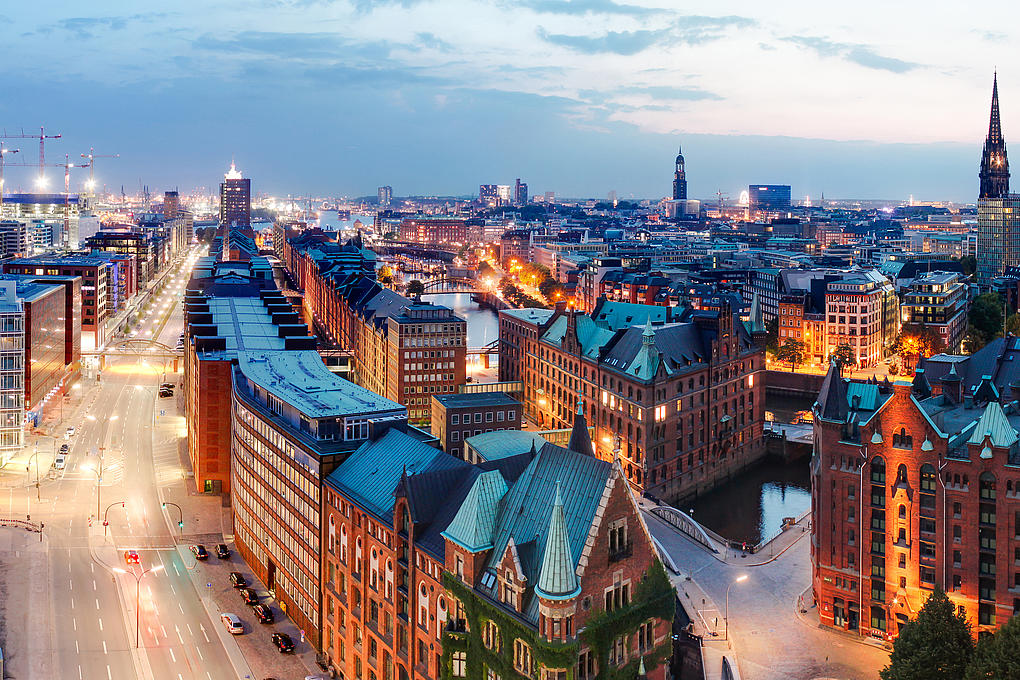05.06.2024
Hamburg’s Speicherstadt historical warehouse district becomes energy storage block
Hamburger Hafen und Logistik AG (HHLA) is working together with leading universities on a research project for the energy-efficient refurbishment of the historic Speicherstadt warehouse district. Under the title “Carbon-neutral World Heritage Speicherstadt Hamburg”, the project is investigating how listed historical buildings can be operated in a climate-neutral way. The initial findings were presented in Hamburg today.

Since 2021, the University of Stuttgart, HafenCity University Hamburg and RWTH Aachen University have been researching a unique project under the leadership of HHLA Real Estate. The goal is to generate and store energy locally and sustainably in Hamburg’s Speicherstadt warehouse district – a UNESCO World Heritage Site since 2015. This is because the energy requirements are high: the Speicherstadt offers around 450,000 m² of gross floor space over more than a kilometre, of which HHLA leases around 300,000 m² to companies as office or warehouse space. The entire area is to be supplied with carbon-neutral energy available locally at the building by 2040. The research team is investigating how the energy required to operate the property can be generated, stored and utilised in the storage facilities themselves. In doing so, a number of requirements for the world heritage landmarked building must be observed and factored into the planning.
The Sandtorkai warehouse (Block H) serves as a pilot project. Here, the research team demonstrates how an entire storage block can be heated emission-free without negatively impacting its historic appearance. Solar hybrid roof systems and innovative storage methods such as ice and solid storage play a central role. The research project covers the generation of solar power and solar thermal energy, the storage of heat and the distribution and control of energy in the building. The efficiency of the test facility will be tested and measured in the research workshop on the ground floor. Meeting rooms and hallways are equipped with state-of-the-art insulation and heating technology as model open-plan offices.
Rainer Schluff, Managing Director of HHLA Real Estate: “HHLA has set itself the ambitious Group-wide goal of achieving climate neutrality by 2040. To achieve this goal, we at HHLA Real Estate rely on state-of-the-art technologies for the refurbishment and management of our properties. Together with our research partners, we have already gained important insights since 2021 which we are now implementing, thus becoming a role model for nationwide projects for existing properties.”
Prof. Dr.-Ing. Harald Garrecht, University of Stuttgart: “If these prototypical developments work, they could be applied immediately to any normal existing building.”
The research carried out as part of this project could be groundbreaking for other existing buildings and monuments in particular. For example, the photovoltaic modules are printed in such a way that they blend in with the existing, world-famous copper and slate roof landscape. At the same time, innovative insulation materials are also used to improve the energy efficiency of the building envelope. These materials are also used in aerospace, for example, to achieve maximum insulation in a minimally invasive way.
In the first of the three phases, the required technologies were developed and set up, among other things. The next phase involves monitoring and evaluation of the data. The findings will then serve as a basis for assessing whether the model can be transferred to the entire Speicherstadt historical warehouse district.
HHLA Real Estate is responsible for the overall coordination of the project, with Forschungszentrum Jülich (FZJ) acting as project sponsor and the research coordination is run by the Institute of Construction Materials at the University of Stuttgart. HafenCity University Hamburg (BIMLab) and RWTH Aachen University (EONERC) are also project partners. The German Ministry for Environment and Energy and the Monument Protection Office of the Free and Hanseatic City of Hamburg support the project in a consultancy capacity as associated partners. The project is funded by the Federal Ministry for Economic Affairs and Climate Protection (BMWK).
Download image

Project Block H in Hamburg's Speicherstadt historical warehouse district

Saving the gray energy
Unique pilot project: energy refurbishment of office properties is being tested under conditions of strict monument protection.
More about the details